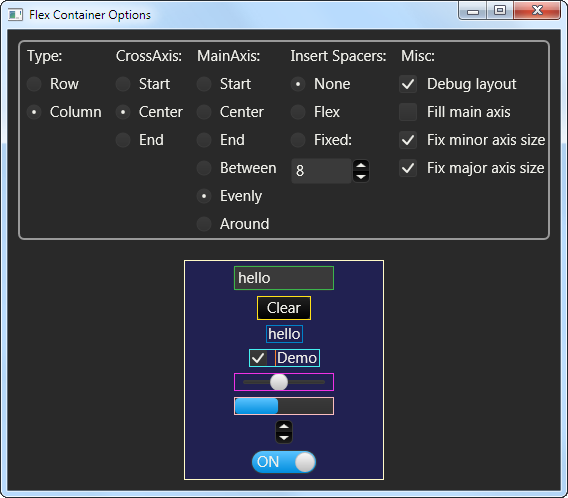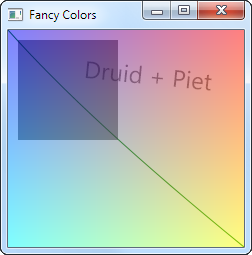
## A data-first Rust-native UI toolkit.
[](https://crates.io/crates/druid)
[](https://docs.rs/druid/)
[](https://github.com/linebender/druid/blob/master/LICENSE)
[](https://xi.zulipchat.com)
Druid is an experimental Rust-native UI toolkit. Its main goal is to offer a
polished user experience. There are many factors to this goal, including
performance, a rich palette of interactions (hence a widget library to support
them), and playing well with the native platform.
See the [goals section](#Goals) for more details.
We have been doing periodic releases of Druid on crates.io, but the API is still unstable. All changes are documented
in [the changelog](https://github.com/linebender/druid/blob/master/CHANGELOG.md).
For an overview of some key concepts, see the (work in progress) [Druid book].
## Project status
**The Druid project is being discontinued by the core developer team.**
New development effort is focused on [Xilem], which has a lot of fundamental changes to allow for
a wider variety of applications with better performance, but it also heavily inherits from Druid.
We see [Xilem] as the future of Druid.
Druid is reasonably usable for [some subset of applications](https://github.com/linebender/druid/issues/1360)
and has a significant testing history, which ensures some stability and correctness.
However we don't expect any major new features to be added to Druid. As such we don't recommend
using Druid for brand new applications. If you insist, then at least make sure your application
doesn't require a feature that Druid doesn't have, e.g. accessibility or 3D support.
## Contributions
As the Druid project is being discontinued, we will still accept all contributions,
but we'll prefer bug fixes and documentation improvements to new features.
A very good place to ask questions and discuss development work is our [Zulip
chat instance], in the #druid-help and #druid channels, respectively.
We gladly accept contributions via GitHub pull requests. Please see
[CONTRIBUTING.md] for more details.
## Example
Here's a simple counter example app:
```rust
use druid::widget::{Button, Flex, Label};
use druid::{AppLauncher, LocalizedString, PlatformError, Widget, WidgetExt, WindowDesc};
fn main() -> Result<(), PlatformError> {
let main_window = WindowDesc::new(ui_builder());
let data = 0_u32;
AppLauncher::with_window(main_window)
.log_to_console()
.launch(data)
}
fn ui_builder() -> impl Widget<u32> {
// The label text will be computed dynamically based on the current locale and count
let text =
LocalizedString::new("hello-counter").with_arg("count", |data: &u32, _env| (*data).into());
let label = Label::new(text).padding(5.0).center();
let button = Button::new("increment")
.on_click(|_ctx, data, _env| *data += 1)
.padding(5.0);
Flex::column().with_child(label).with_child(button)
}
```
Check out the [the examples folder] for a more comprehensive demonstration of
Druid's existing functionality and widgets. Check [druid_widget_nursery](https://github.com/linebender/druid-widget-nursery) for more widgets.
## Screenshots
[](/druid/examples/calc.rs)
[](/druid/examples/flex.rs)
[](/druid/examples/custom_widget.rs)
## Using Druid
An explicit goal of Druid is to be easy to build, so please open an issue if you
run into any difficulties. Druid is available on [crates.io] and should work as
a lone dependency (it re-exports all the parts of `druid-shell`, `piet`, and `kurbo`
that you'll need):
```toml
druid = "0.8.3"
```
Since Druid is currently in fast-evolving state, you might prefer to drink from
the firehose:
```toml
druid = { git = "https://github.com/linebender/druid.git" }
```
### Platform notes
#### Linux
On Linux, Druid requires gtk+3; see [GTK installation page].
(On ubuntu-based distro, running `sudo apt-get install libgtk-3-dev` from the terminal will do the job.)
#### OpenBSD
On OpenBSD, Druid requires gtk+3; install from packages:
```sh
pkg_add gtk+3
```
Alternatively, there is an X11 backend available, although it is currently
[missing quite a few features](https://github.com/linebender/druid/issues?q=is%3Aopen+is%3Aissue+label%3Ashell%2Fx11+label%3Amissing).
You can try it out with `--features=x11`.
## Goals
Druid's goal is to make it easy to write and deploy high quality desktop
applications with a smooth and polished user experience on all common
platforms. In order to achieve this we strive for a variety of things:
- Make it easy to build and package on all supported platforms.
- Implement abstractions to avoid platform specific quirks.
- Respect platform conventions and expectations.
- Handle display resolution and scaling reliably with little effort.
- Enable easy, yet powerful internationalization.
- Offer robust accessibility support.
- Produce small and fast binaries with low memory usage.
- Have a small dependency tree, a high quality code base and good organization.
- Focus on powerful, desktop-grade applications.
- Provide a flexible set of layouts and common widgets.
- Ease creation of custom components and application logic as needed.
### Non-Goals
In order to fulfill those goals, we cannot support every use case. Luckily
the Rust community is working on a variety of different libraries with
different goals, so here are some of Druid's non-goals and possible
alternatives that can offer those capabilities:
- Use the platform-native widgets or mimic them. ([Relm], [Slint])
- Embed easily into custom render pipelines. ([Conrod])
- Adhere to a specific architectural style such as Elm. ([Iced], [Relm])
- Support rendering to HTML when targeting the web. ([Iced], [Moxie])
Druid is just one of many ongoing [Rust-native GUI experiments]. If it
doesn't suit your use case, perhaps one of the others will!
## Concepts
### druid-shell
The Druid toolkit uses `druid-shell` for a platform-abstracting application shell.
`druid-shell` is responsible for starting a native platform runloop, listening to
events, converting them into a platform-agnostic representation, and calling a
user-provided handler with them.
While `druid-shell` is being developed with the Druid toolkit in mind, it is
intended to be general enough that it could be reused by other projects
interested in experimenting with Rust GUI. The `druid-shell` crate includes a
couple of [non-`druid` examples].
### piet
Druid relies on the [Piet library] for drawing and text layout. Piet is a 2D graphics
abstraction with multiple backends: `piet-direct2d`, `piet-coregraphics`, `piet-cairo`,
`piet-web`, and `piet-svg` are currently available.
In terms of Druid platform support via Piet, macOS uses `piet-coregraphics`,
Linux/OpenBSD/FreeBSD use `piet-cairo`, Windows uses `piet-direct2d`, and web uses `piet-web`.
```rust
use druid::kurbo::{BezPath, Point, Rect};
use druid::piet::Color;
// Create an arbitrary bezier path
// (ctx.size() returns the size of the layout rect we're painting in)
let mut path = BezPath::new();
path.move_to(Point::ORIGIN);
path.quad_to(
(80.0, 90.0),
(ctx.size().width, ctx.size().height),
);
// Create a color
let stroke_color = Color::rgb8(0x00, 0x80, 0x00);
// Stroke the path with thickness 1.0
ctx.stroke(path, &stroke_color, 1.0);
// Rectangles: the path for practical people
let rect = Rect::from_origin_size((10., 10.), (100., 100.));
// Note the Color:rgba8 which includes an alpha channel (7F in this case)
let fill_color = Color::rgba8(0x00, 0x00, 0x00, 0x7F);
ctx.fill(rect, &fill_color);
```
### widgets
Widgets in Druid (text boxes, buttons, layout components, etc.) are objects
which implement the [Widget trait]. The trait is parametrized by a type (`T`)
for associated data. All trait methods (`event`, `lifecycle`, `update`, `paint`,
and `layout`) are provided with access to this data, and in the case of
`event` the reference is mutable, so that events can directly update the data.
Whenever the application data changes, the framework traverses the widget
hierarchy with an `update` method.
All the widget trait methods are provided with a corresponding context
([EventCtx], [LifeCycleCtx], [UpdateCtx], [LayoutCtx], [PaintCtx]). The widget can request
things and cause actions by calling methods on that context.
In addition, all trait methods are provided with an environment `Env`, which
includes the current theme parameters (colors, dimensions, etc.).
```rust
impl<T: Data> Widget<T> for Button<T> {
fn event(&mut self, ctx: &mut EventCtx, event: &Event, data: &mut T, env: &Env) {
...
}
fn lifecycle(&mut self, ctx: &mut LifeCycleCtx, event: &LifeCycle, data: &T, env: &Env) {
...
}
fn update(&mut self, ctx: &mut UpdateCtx, old_data: &T, data: &T, env: &Env) {
...
}
fn layout(&mut self, ctx: &mut LayoutCtx, bc: &BoxConstraints, data: &T, env: &Env) -> Size {
...
}
fn paint(&mut self, ctx: &mut PaintCtx, data: &T, env: &Env) {
...
}
}
```
Druid provides a number of [basic utility and layout widgets] and it's easy to
implement your own. You can also compose widgets into new widgets:
```rust
fn build_widget() -> impl Widget<u32> {
let mut col = Flex::column();
for i in 0..30 {
let button = Button::new(format!("Button {}", i).padding(5.0);
col.add_child(button);
}
Scroll::new(col)
}
```
### layout
Druid's layout protocol is strongly inspired by [Flutter's box layout model].
In Druid, widgets are passed a `BoxConstraint` that provides them a minimum and
maximum size for layout. Widgets are also responsible for computing appropriate
constraints for their children if applicable.
### data
Druid uses a [Data trait] to represent [value types]. These should be cheap to
compare and cheap to clone.
In general, you can use `derive` to generate a `Data` impl for your types.
```rust
#[derive(Clone, Data)]
struct AppState {
which: bool,
value: f64,
}
```
### lens
The [Lens datatype] gives access to a part of a larger data structure. Like
`Data`, this can be derived. Derived lenses are accessed as associated constants
with the same name as the field.
```rust
#[derive(Clone, Data, Lens)]
struct AppState {
which: bool,
value: f64,
}
```
To use the lens, wrap your widget with `LensWrap` (note the conversion of
CamelCase to snake_case):
```rust
LensWrap::new(WidgetThatExpectsf64::new(), AppState::value);
```
Alternatively, lenses for structs, tuples, and indexable containers can be
constructed on-demand with the `lens` macro:
```rust
LensWrap::new(WidgetThatExpectsf64::new(), lens!(AppState, value));
```
This is particularly useful when working with types defined in another crate.
## Authors
The main authors are Raph Levien and Colin Rofls, with much support from an
active and friendly community. See the AUTHORS file for more.
[Runebender]: https://github.com/linebender/runebender
[the examples folder]: /druid/examples
[Piet library]: https://github.com/linebender/piet
[custom_widget]: /druid/examples/custom_widget.rs
[basic utility and layout widgets]: /druid/src/widget
[Flutter's box layout model]: https://api.flutter.dev/flutter/rendering/BoxConstraints-class.html
[value types]: https://sinusoid.es/lager/model.html#id2
[GTK installation page]: https://www.gtk.org/docs/installations/linux/
[Rust-native GUI experiments]: https://areweguiyet.com
[CONTRIBUTING.md]: /CONTRIBUTING.md
[Zulip chat instance]: https://xi.zulipchat.com
[non-`druid` examples]: /druid-shell/examples/shello.rs
[crates.io]: https://crates.io/crates/druid
[EventCtx]: https://docs.rs/druid/0.8.3/druid/struct.EventCtx.html
[LifeCycleCtx]: https://docs.rs/druid/0.8.3/druid/struct.LifeCycleCtx.html
[LayoutCtx]: https://docs.rs/druid/0.8.3/druid/struct.LayoutCtx.html
[PaintCtx]: https://docs.rs/druid/0.8.3/druid/struct.PaintCtx.html
[UpdateCtx]: https://docs.rs/druid/0.8.3/druid/struct.UpdateCtx.html
[Widget trait]: https://docs.rs/druid/0.8.3/druid/trait.Widget.html
[Data trait]: https://docs.rs/druid/0.8.3/druid/trait.Data.html
[Lens datatype]: https://docs.rs/druid/0.8.3/druid/trait.Lens.html
[Druid book]: https://linebender.org/druid/
[Iced]: https://github.com/hecrj/iced
[Conrod]: https://github.com/PistonDevelopers/conrod
[Relm]: https://github.com/antoyo/relm
[Moxie]: https://github.com/anp/moxie
[Slint]: https://github.com/slint-ui/slint
[Xilem]: https://github.com/linebender/xilem